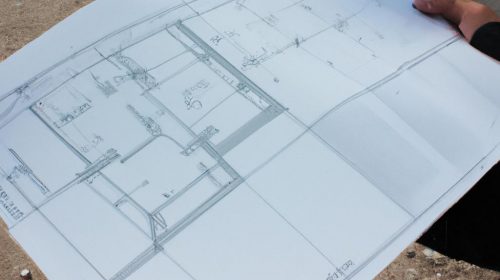Home Inspections: Essential Guidance for Real Estate Property Assistance
Home inspections play a vital role in the process of purchasing real estate properties, providing essential guidance and assistance to potential buyers. These inspections involve thorough assessments of various aspects of a property, such as its structural integrity, electrical systems, plumbing, and overall safety measures. By identifying any existing or potential issues within a property, home inspections enable buyers to make informed decisions regarding their investment. For instance, imagine a prospective buyer who is interested in purchasing an older house with charming architectural features. While the exterior may appear aesthetically pleasing, a professional home inspection could reveal hidden concerns like faulty wiring or foundational weaknesses that might require significant repairs and additional costs.
In addition to uncovering potential problems, home inspections also provide valuable insights into the long-term maintenance needs and overall condition of a property. By thoroughly examining all accessible areas of the house, including attics, basements, crawl spaces, roofs, and other critical components, inspectors can identify signs of wear and tear or inadequate maintenance practices. This knowledge empowers buyers to negotiate better terms or request necessary repairs before finalizing their purchase agreement. Moreover, it allows them to plan for future expenses related to upkeep and renovations effectively. Ultimately, conducting comprehensive home inspections ensures that purchasers are well-informed about the property they are considering and helps to minimize the risk of unexpected expenses or safety hazards after the purchase is complete. By obtaining a detailed inspection report, buyers can make educated decisions about their investment and confidently move forward with their real estate transaction.
Understanding the Importance of Home Inspections
The significance of home inspections cannot be overstated when it comes to purchasing or selling a property. By thoroughly examining the condition and structure of a house, these inspections provide vital information that can help buyers make informed decisions and sellers address any potential issues before listing their homes on the market.
Example: For instance, consider the case of Mr. and Mrs. Johnson, who were interested in purchasing an older home with charming architectural features. Before proceeding with the purchase, they decided to have a home inspection conducted by a qualified professional. During the inspection, several hidden structural problems were uncovered, including foundation cracks and outdated electrical wiring. Armed with this knowledge, the Johnsons were able to renegotiate the price based on estimated repair costs or choose not to proceed with the purchase if they deemed it too risky.
Importance of Home Inspections:
-
Uncovering Hidden Issues: A thorough home inspection can reveal underlying problems that may not be immediately apparent during a casual viewing. These could include water damage, pest infestations, mold growth, faulty plumbing, or roofing issues. Addressing such issues early on can save both buyers and sellers from potential financial burdens down the line.
-
Ensuring Safety: Another crucial aspect of home inspections is ensuring safety within the property. Electrical systems should meet current standards to prevent fire hazards; foundations should be stable to avoid structural risks; and heating, ventilation, and air conditioning (HVAC) systems must function properly for adequate comfort all year round.
-
Assessing Value: Home inspections also aid in determining whether a property’s asking price accurately reflects its true value. If significant repairs are required due to unforeseen issues discovered during an inspection, buyers can negotiate prices accordingly or opt out of buying altogether.
-
Peace of Mind: Finally, undergoing a comprehensive home inspection provides peace of mind for both parties involved in real estate transactions. Buyers gain confidence in their investment knowing they have a clear understanding of the property’s condition, while sellers can be assured that any potential issues have been addressed or disclosed.
Table: Common Issues Revealed by Home Inspections
| Issue | Impact |
|---|---|
| Water damage | Potential for mold growth and structural instability |
| Pest infestations | Health risks and further damage to the property |
| Faulty plumbing | Leaks, water pressure problems, and potential flooding hazards |
| Roofing issues | Risk of leaks, compromised insulation, and increased energy costs |
In summary, home inspections play a crucial role in real estate transactions. By uncovering hidden issues, ensuring safety standards are met, assessing value accurately, and providing peace of mind to all parties involved, these inspections provide invaluable guidance throughout the buying or selling process. Now that we understand the importance of home inspections let us delve into the next section on preparing for a home inspection.
Preparing for a Home Inspection
To further illustrate this point, let’s consider an example:.
Imagine a potential buyer named Sarah who is looking to purchase her first home. She comes across a charming house that seems perfect at first glance, but she decides to have it inspected before making any commitments. During the inspection, the inspector discovers hidden water damage and structural issues that were not evident during Sarah’s initial visit. Thanks to the thorough examination conducted by the inspector, Sarah avoids purchasing a property with underlying problems that could have cost her significant time and money down the road.
Now, let us delve deeper into why home inspections are crucial when buying or selling a property:
-
Uncover hidden defects: A comprehensive inspection can reveal potential issues that may not be apparent to an untrained eye. This includes identifying structural concerns, electrical problems, plumbing leaks, roof damages, pest infestations, and more. By uncovering these defects early on through an inspection, buyers can make informed decisions about whether they want to proceed with the purchase or negotiate repairs with the seller.
-
Assess safety hazards: Safety should always be a top priority when considering any real estate investment. An inspection ensures that all vital systems within a property meet safety standards. For instance, it can identify faulty wiring or outdated electrical panels that pose fire hazards. It can also highlight health risks such as mold growth due to moisture intrusion or asbestos-containing materials present in older homes.
-
Plan for maintenance and repairs: Home inspectors provide valuable insights into anticipated maintenance needs and required repairs for both buyers and sellers alike. This information allows buyers to budget for future expenses while sellers can address necessary fixes before listing their property for sale.
-
Enhance negotiating power: Armed with detailed knowledge from an inspection report, buyers gain leverage during negotiations. They can request price reductions or ask sellers to address repair issues before finalizing the transaction. On the other hand, sellers who obtain pre-listing inspections can proactively resolve any concerns and present a well-maintained property to potential buyers.
To summarize, home inspections are integral to real estate transactions as they uncover hidden defects, assess safety hazards, assist in planning for maintenance and repairs, and enhance negotiating power. In our next section, we will discuss how to choose a qualified home inspector to ensure a thorough examination of your prospective property. By following these steps, you’ll be better equipped to make informed decisions regarding your real estate investment.
Choosing a Qualified Home Inspector
After understanding the importance of preparing for a home inspection, it is crucial to select a qualified professional who can thoroughly assess your property. By choosing a reputable home inspector, you can ensure that potential issues are identified accurately and promptly addressed.
Example case study:
For instance, consider the scenario where Sarah recently purchased her dream home in a suburban neighborhood. Eager to move in, she decided to hire a local home inspector recommended by friends who had previously used their services. The inspector was knowledgeable and experienced, conducting an extensive examination of the property. This diligent approach unveiled several hidden structural problems that were not apparent during Sarah’s initial walkthrough.
Choosing a qualified home inspector involves considering various factors:
- Credentials: Look for inspectors with relevant certifications such as membership in reputable organizations like the American Society of Home Inspectors (ASHI) or International Association of Certified Home Inspectors (InterNACHI).
- Experience: Prioritize professionals with significant experience in the field. An established track record indicates their ability to identify potential concerns effectively.
- Reputation: Seek recommendations from trusted sources or consult online reviews to gauge an inspector’s reputation within the community.
- Insurance and Licensing: Ensure that the selected inspector holds appropriate liability insurance coverage and any required state licenses.
To further emphasize the significance of selecting an expert home inspector, consider this comparison table:
| Unqualified Inspector | Qualified Inspector | |
|---|---|---|
| Identification | May miss crucial | Highly trained |
| of Issues | defects | in identifying |
| potential problems | ||
| Liability | Limited accountability | Professional |
| Coverage | if errors occur | liability |
| protection |
By opting for a qualified home inspector, homeowners gain peace of mind knowing that their property will undergo meticulous scrutiny. This proactive approach helps detect hidden issues that can impact the property’s value or pose potential risks in the future.
Now, equipped with knowledge about choosing a qualified home inspector, let us explore what homeowners should expect during an actual home inspection process.
What to Expect During a Home Inspection
Section H2: What to Expect During a Home Inspection
Transitioning smoothly from the previous section on choosing a qualified home inspector, it is now important to understand what to expect during a home inspection. To shed light on this matter, let’s consider an example scenario:
Imagine you are in the process of purchasing your dream home, and you have scheduled a home inspection with a qualified professional. The day arrives, and the inspector arrives promptly at the agreed-upon time. They begin by thoroughly examining both the exterior and interior of the property, meticulously inspecting each component for any potential issues.
During a typical home inspection, there are several key aspects that will be evaluated. Here is a breakdown of what you can anticipate:
- Structural Components: The inspector will assess the foundation, walls, roof structure, and other structural elements to ensure they are sound and free from any signs of damage or deterioration.
- Electrical Systems: All electrical outlets, wiring, circuit breakers, lighting fixtures, and appliances will be inspected to verify their functionality and safety compliance.
- Plumbing Systems: From pipes to faucets and drains, the plumbing system will be examined for leaks, proper water pressure distribution, functioning toilets and sinks, as well as adequate ventilation.
- HVAC Systems: Heating, ventilation, and air conditioning systems will undergo scrutiny to determine if they are operating efficiently while also checking for potential malfunctions or safety hazards.
To provide further clarity regarding these expectations during a home inspection evaluation process as described above:
| Aspect | Purpose |
|---|---|
| Structural Components | Ensure stability and identify potential issues |
| Electrical Systems | Verify functionality and adherence to safety standards |
| Plumbing Systems | Check for leaks and proper operation |
| HVAC Systems | Assess efficiency and detect possible problems |
Understanding what constitutes a thorough home inspection gives buyers peace of mind when making one of life’s biggest investments – real estate properties. By having a clear understanding of the inspection process, individuals can confidently navigate their way through this crucial step in the home buying journey.
Transitioning seamlessly into the subsequent section about common issues found during home inspections, buyers should be aware that despite these evaluations, potential problems might still arise. It is essential to address any discovered concerns promptly to avoid future complications and ensure one’s investment remains secure.
Common Issues Found During Home Inspections
Transition from previous section:
Having discussed what to expect during a home inspection, it is important to understand the common issues that are often found during these inspections. Identifying such problems beforehand can help potential buyers make informed decisions about their real estate investments.
Common Issues Found During Home Inspections
To illustrate the significance of identifying common issues during home inspections, let’s consider an example scenario. Imagine a family looking to purchase a charming older house in a quiet neighborhood. Upon conducting a thorough home inspection, several concerning issues were discovered:
- The roof showed signs of wear and tear, with missing shingles and areas prone to leakage.
- The electrical system was outdated and posed potential safety hazards.
- Evidence of termite infestation was found in the basement, indicating possible structural damage.
- The plumbing revealed leaks in various fixtures throughout the property.
These examples highlight the importance of inspecting homes before finalizing any real estate transactions. By uncovering such concerns early on, prospective homeowners can assess whether they have the resources and willingness to address them adequately.
Additionally, understanding some of the most common issues encountered during home inspections can prepare individuals for similar challenges they may encounter themselves. Here are four noteworthy points to keep in mind:
-
Structural integrity: Assessing the overall condition of the foundation, walls, floors, and ceilings is crucial as underlying structural issues can be both expensive and time-consuming to rectify.
-
Plumbing and drainage systems: Evaluating water supply lines, sewage systems, and checking for leakages or poor drainage ensures functionality while preventing future headaches.
-
Electrical systems: Verifying if wiring meets current code requirements reduces risks associated with faulty connections or inadequate electrical capacity.
-
HVAC (Heating, Ventilation, and Air Conditioning) systems: Ensuring proper functioning of heating and cooling equipment guarantees comfort within the household while minimizing unnecessary expenses.
Consider this table summarizing common issues found during home inspections:
| Common Issues | Description |
|---|---|
| Roof Problems | Missing shingles, leaks, or signs of deterioration |
| Plumbing Concerns | Leaks, water pressure issues, faulty fixtures |
| Electrical Deficiencies | Outdated wiring, insufficient outlets, inadequate grounding |
| Pest Infestations | Evidence of termites, rodents, or other pests |
Using Home Inspection Reports for Negotiation
By understanding the common problems found during home inspections and their potential implications on a property’s value and safety, buyers can use this information as leverage in negotiations. The next section will delve into how to effectively utilize home inspection reports when engaging in price discussions with sellers.
[Transition to subsequent section:] Armed with knowledge about what to expect during home inspections and the common issues that may arise, individuals are now well-equipped to navigate the negotiation process using comprehensive home inspection reports.
Using Home Inspection Reports for Negotiation
As mentioned earlier, home inspections play a crucial role in identifying potential issues that may affect the value or safety of a property. Once you receive the inspection report, it becomes an invaluable tool in negotiating terms and conditions with the seller. By understanding how to effectively utilize this information, you can make informed decisions and ensure a fair deal.
Case Study:
To illustrate the significance of using home inspection reports during negotiation, let’s consider a hypothetical scenario. John is interested in purchasing a house listed at $300,000. After conducting a thorough home inspection, he discovers several significant issues such as foundation cracks, electrical faults, plumbing leaks, and roof damage. Armed with this knowledge, John now has leverage to negotiate a lower price or request repairs before finalizing the purchase.
When utilizing home inspection reports for negotiation purposes, keep the following points in mind:
- Prioritize major issues: Focus on addressing critical problems that pose immediate risks or require substantial financial investments.
- Research repair costs: Obtain estimates for repairing identified issues to have accurate figures when discussing potential adjustments to the purchase price.
- Consider long-term implications: Assess if any underlying problems identified during the inspection could lead to additional expenses down the line.
- Request professional opinions: Seek advice from contractors or specialists regarding specific concerns highlighted in the inspection report.
Table – Prospective Negotiation Points:
| Issue | Repair Cost (Estimate) | Potential Impact |
|---|---|---|
| Foundation Cracks | $5,000 | Structural |
| Electrical Faults | $3,500 | Safety |
| Plumbing Leaks | $2,000 | Water Damage |
| Roof Damage | $7,000 | Weatherproofing |
By referencing both bullet point lists and table provided above during negotiations, you can effectively emphasize the significance of identified issues and their potential financial implications. This approach allows for a more objective discussion, enabling both parties to reach a fair agreement that considers the property’s actual condition.
In summary, utilizing home inspection reports empowers buyers with valuable insights into a property’s condition. By prioritizing major issues, researching repair costs, considering long-term impacts, and seeking professional opinions, prospective buyers can negotiate terms that account for necessary repairs or adjustments in price. Remember, thorough analysis and open communication are key when using home inspections as negotiation tools.



